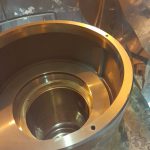The demand for metals such as copper, which are essential for electric vehicles (EVs), remains robust despite concerns over a slowdown in EV sales, according to Tom Mackay, head of refined metals at commodity trader IXM. He noted that accurately forecasting demand is challenging as the market continues to evolve.
The decline in EV sales can be attributed to several factors, including inadequate charging infrastructure and concerns regarding resale values. “The electric vehicle industry is still in its infancy, with various factors like penetration rates and battery chemistries complicating accurate demand forecasts,” Mackay explained.
Despite this slowdown, EV sales continue to grow, albeit at different rates across regions. “Overall, growth in the EV sector remains strong, and the demand narrative for metals like copper is positive,” he added.
Consultancy Rho Motion reported that sales of battery electric vehicles (BEVs) and plug-in hybrids increased by 32% last year, totaling 13.63 million units. However, the sales figures for the first and second quarters of this year showed mixed outcomes, with a 25% decline in the first quarter but a 22% increase in the second compared to previous periods.
Copper is a crucial component in EV wiring and batteries, along with other metals like lithium, nickel, and cobalt, depending on the battery chemistry.
Recent advancements in lithium iron phosphate (LFP) batteries, which are widely used in China, have significantly enhanced performance. “Some LFP batteries can now achieve ranges of up to 1,000 km and can charge to 80% in just 10 minutes,” Mackay noted.
Initially developed as a cost-effective alternative to nickel-cobalt-manganese (NCM) batteries, LFP batteries were not as suited for long-distance travel. However, Mackay believes that NCM batteries will likely remain prevalent in Western markets due to their higher recyclability value. “Recyclability is a key consideration for automakers when selecting battery chemistries,” he stated.
Mackay also discussed recent changes at IXM, including a reduction in global workforce to around 440 employees, emphasizing a shift towards quality over quantity. The company exited the aluminum business due to insufficient returns, reallocating resources to more profitable ventures.
4o mini















